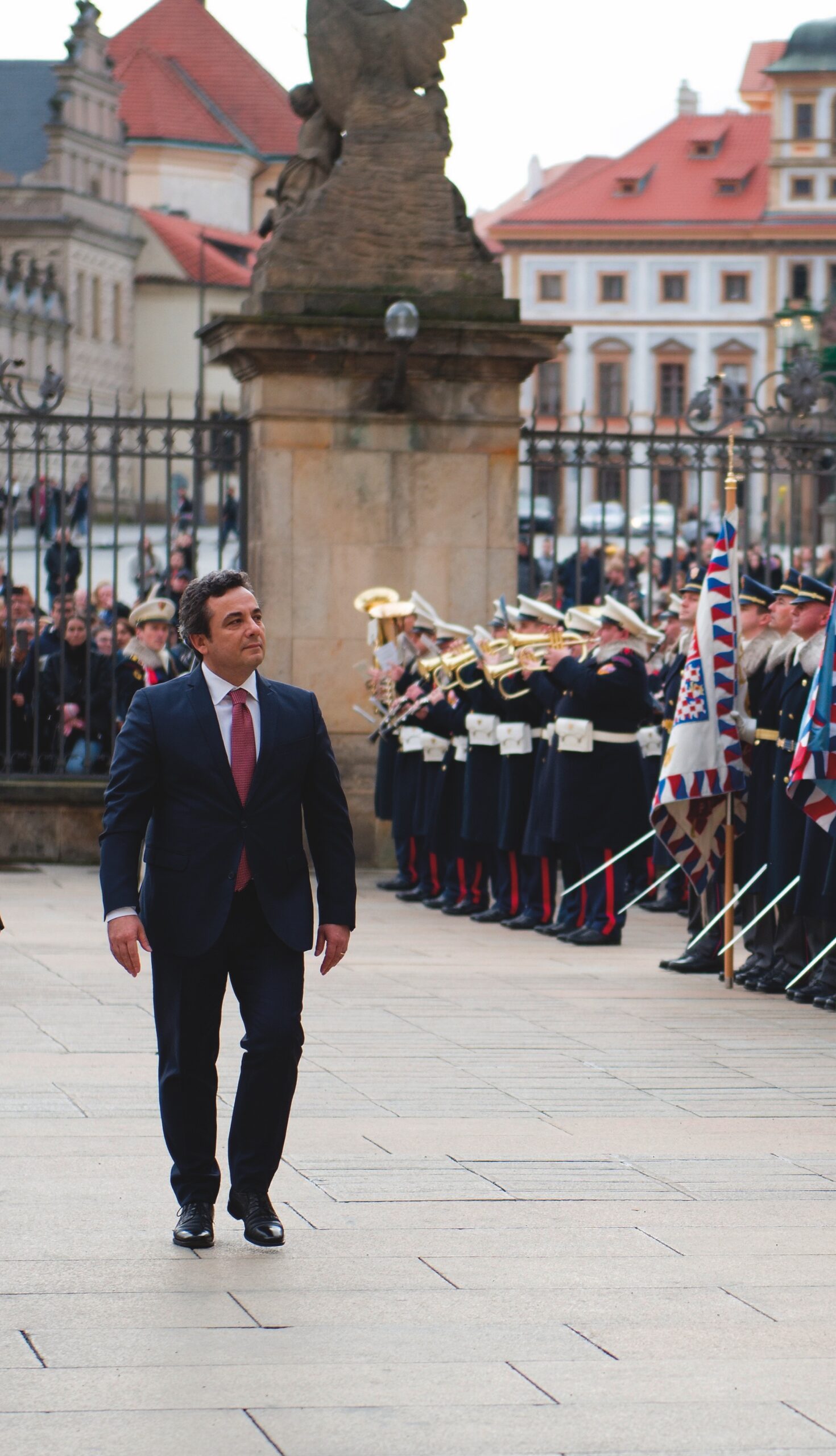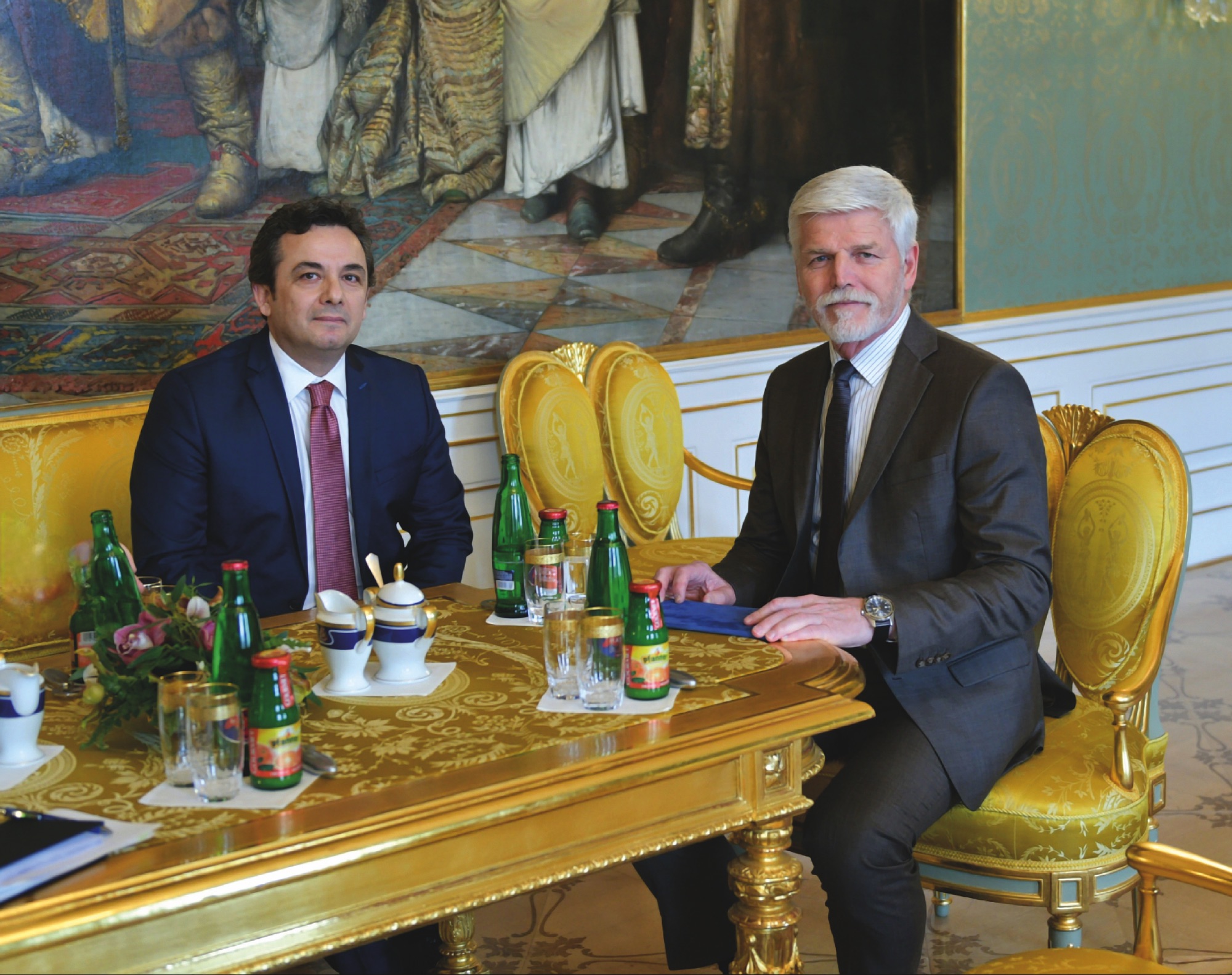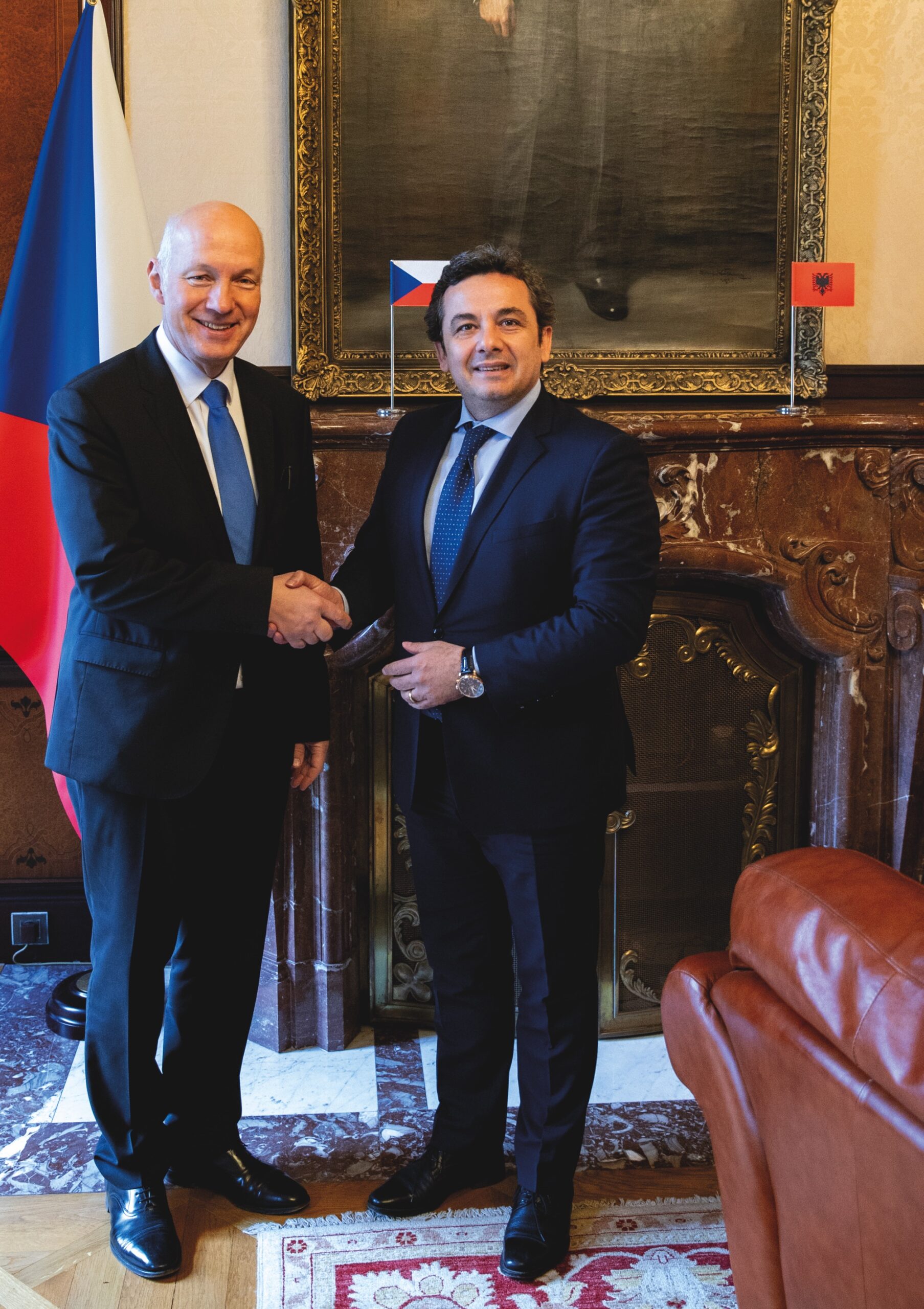We have never lost our patience, nor have we changed course

H.E. Mr. Ilir Tepelena, Ambassador of Albania
Text: Martina Hošková and M.Zisso; Photo: Archive
Before we start speaking about our countries, can you tell us about yourself?
Let me first thank you for the invitation to be part of your magazine, and wish you and your team all the best in your work and continued success in the future.
Back to your question “about myself”, I am a husband and father of four children – one daughter and three sons. Out of my 54 years of life, I have dedicated 30 years to diplomacy, a career I have pursued with great passion. Even after three decades, it has never lost its appeal, and I hope that one of my children will follow in my footsteps to become a diplomat. My education in foreign languages, coupled with my love for diplomacy, has allowed me to travel extensively. I particularly enjoy bilateral diplomacy, where I can explore different civilizations, cultures, and traditions. These experiences not only broaden my perspective but also help me identify commonalities between my home country, Albania, and the nations where I serve.
What made you become an ambassador?
These days, as I mark 30 years in diplomacy, I reflect not just on how I became an ambassador, but on what made me a diplomat in the first place. Growing up in communist, isolated Albania, I remember going on family vacations by the sea. Even then, I would imagine what life might be like beyond the shores, dreaming of traveling the world through the images we secretly watched on Italian television. These early experiences shaped my curiosity about the world, and set me on the path to diplomacy.
When the time came for high school, many of my classmates wanted to pursue careers as doctors, engineers, architects, and so on. I, however, chose to attend a foreign language school because it offered three possible futures: becoming a teacher, a translator, or, the most challenging of all, a diplomat.
Destiny led me to where I had always dreamed, and, in 1994, I was accepted into the Foreign Service. From there, I held various positions, starting from the lowest ranks and gradually advancing to senior roles within the Ministry of Foreign Affairs, such as Director, Director General, and Chief of Staff to the Minister. This natural progression eventually culminated in my promotion to become an Ambassador.
Did you serve in many countries before coming to Prague?
Prague, or the Czech Republic, is my sixth destination in my diplomatic career. My first posting was in Madrid in 1997, followed by Paris (1999-2003), Rome (2005-2008), Brussels (2010-2014), Bucharest (2015-2023), and now here in Prague, since December 2023.
My first time serving as Ambassador of Albania was in Brussels, representing my country in the Kingdom of Belgium and (non-resident) in the Grand Duchy of Luxembourg. After that, I was posted in Romania, and now I continue my journey as Ambassador to the Czech Republic.

H.E. Mr. Ilir Tepelena and Mr. Petr Pavel, President of the Czech Republic
That means you have been in the Czech Republic for almost a year now. How do you feel about that?
I must admit that, together with my family, we had already visited almost all of Europe, including Bratislava, but never Prague. However, destiny (and I do believe in destiny) wanted me to settle for a longer time in Prague. This city has been a delightful surprise, capturing my heart with its history, culture, and architecture. As a family, we decided to explore Prague through a book about “77 Legends”, discovering that nearly every neighborhood has its own tales. What stands out most to me is that this city, with its numerous galleries and the iconic Charles Bridge – which I often cross on my way to the embassy – has rekindled a long-lost passion of mine: the muse to paint. Additionally, I must acknowledge the special impression left by my Czech and Albanian friends, who have made it easy for my family and I to settle in and feel right at home.
What do you do in your free time?
Most of my free time is spent walking, reading, and meeting with friends, mainly from the Albanian community. Prague is a city that encourages walks. Besides its beautiful parks, it has medieval alleyways that often give me the pleasure of wandering without a specific destination, ‘losing’ myself among them and discovering places that might not even be found in tourist guides. As for reading, I feel like I’m gaining a deeper understanding of Kafka and Kundera, whom I am rereading here. The parks and surrounding buildings have also brought me back to reading classic authors. Meeting with Albanian friends, over a Czech beer, is a joy in itself. And speaking of Albanian friends, thanks to Qazim Laçi (one of the most famous football players of the Albanian National Team) and his generous invitations, I’ve become a fan of Sparta Prague, and the “Epet Arena” stadium has now become a regular part of my free time.
After three decades in diplomacy and eventually becoming an ambassador, what do you find to be the most difficult part of this position?
Being an ambassador is a special privilege, a source of pride, and a great responsibility. The most challenging aspect is the desire for perfection and the constant effort to achieve it. In a foreign country, there are always unexpected situations, and things may not always go as planned or meet expectations.
An ambassador is always striving for tangible results and is constantly active in identifying common ground between different nations and peoples, with the aim of building on those connections. Not all projects that are initially conceived end up being fully realized, and this happens for a variety of reasons. Therefore, while many of them start with a strong concept and intention, not all of them reach completion as planned. It’s crucial that the difficulty in achieving a particular objective doesn’t turn into frustration or an obstacle, but rather serves as an encouragement to take a different approach.
I would like to expand on this argument by noting that one of the greatest and most common challenges or the most difficult part shared among ambassadors worldwide, is the limited time we have to spend with our families. The demanding nature of our roles, frequent travel, and the responsibilities of representing our country often mean that our personal time is restricted.

H.E. Mr. Ilir Tepelena and Senator Pavel Fischer, Chairperson of the Committee on Foreign Affairs, Defence and Security
Albania is a member of NATO. Do you see much progress and support on your way to EU membership?
I would like to begin my answer by sharing some major news and a historic moment for Albania and the Albanians. On October 15th, 2024, in Luxembourg, during the second Intergovernmental Conference between Albania and the EU, it was officially decided to launch Albania’s EU membership negotiations. This is an important milestone, marking the opening of negotiations on the fundamental chapters – where Albania reaffirms its commitment to meet all future obligations – with the ultimate goal of full EU membership, which we are optimistic will be achieved by 2030.
As Prime Minister Edi Rama expressed during his remarks in Luxembourg: “To become a member state, you have to raise not only the spirits but also all the forces to work together in the reality of the country to guarantee a country that works well, serves its citizens, and sanctions in daily life, what is written in the Constitution and all commitments. So, this is our homework, it’s a mountain to climb, but right now we’re on our way up with pretty clear ideas, with pretty strong will, and there’s no doubt that we’re going to achieve what needs to be achieved, which means Albania will be in the EU within 2030.”
Beyond this great news, I would also like to add that EU integration is a process based in merit, in fulfilling all standards. However, we have to accept that, in the end, the decision for integration is political. It is largely accepted that the enlargement process has been very long and tiring. We have never lost our patience, nor have we changed course. We strongly believe and are working to reach – as soon as possible – our national objective to be together within the European family. The integration process has helped improve national cohesion toward our national objective; has allowed a series of transformational and fruitful reforms in all areas; has improved economic growth, encouraged investments, promoted tourism, and helped improve the image of the country; and it has strengthened security and the fight against corruption and organized crime.
The integration process has also strengthened regional cooperation as a basic element of a common future where Albania, even as a member of NATO, has been – and will continue to be – a stabilizing factor. The new EU Growth Plan for the Western Balkans is a transformative tool. This Plan offers a concrete opportunity to bring the region closer to the EU single market, deepen regional economic integration, and accelerate fundamental reforms. It will contribute towards promoting socio-economic convergence, bringing tangible benefits to its citizens and supporting the Western Balkans’ path towards EU membership.
In this final stage towards full EU membership, I want to highlight that Albania has a strong and solid support from all EU member states, and particularly from the Czech Republic. In every meeting I have had since arriving in Prague, and throughout all the high-level meetings as part of the political dialogue between our two governments, the Czech Republic has been unwavering in its commitment to support Albania in this process. Specifically, it has offered its experience and expertise to assist us in the recently-launched EU accession negotiations, reinforcing our confidence as we move forward.
This ‘common future’ will inevitably bring more foreign tourists to your country. How do you promote Albania here in Czechia?
A few days after arriving in Prague, at an event dedicated to the renowned Albanian film director Pirro Milkani where we were promoting his memoir, I had a brief encounter with Luboš Vránek.
He handed me a hefty book titled “Rough Beauty of Albania” (Drsná krása Albánie), adding that he would like us to launch it together. That evening, I started flipping through the pages, and the next day I wrote to Mr. Vránek to confirm that I would be delighted to attend the book launch (all 520 pages of it). Two months later, at the Prague Library, we spent over two hours with a large audience that was captivated by the detailed journey of a thoughtful traveler. I was pleasantly surprised and admitted that this man knew my country better than I did.
It became clear to me that Czech tourists are not the classic beach-and-sun type. Instead, they seek and appreciate the full range of what a“piece of land” like Albania offers: lovely beaches, more than 300 sunny days per year, majestic and breathtaking mountains, beautiful small towns, lakes, rivers, ancient and contemporary culture, delicious Mediterranean cuisine, and above all, warm and welcoming hospitality.
With 9.7 million foreign visitors up until September 2024 – including over 4.5 million in protected areas and over 1 million at cultural sites – the 2024 summer season set new records! During this time, around 70,000 Czech tourists visited Albania, marking an increase of 92.8% compared to the same period in 2023 (32,000), setting a new record for the number of Czech tourists.
In Prague, I found two airlines operating direct flights – Wizz Air and Ryanair – but it seemed insufficient to meet the high demand from Czech tourists.
I quickly arranged meetings with the executives at Smartwings to convince them not to limit flights to just the summer season.
In March of this year, together with former Minister of Industry and Trade, Jozef Síkela, we organized a Business Forum in Tirana, which focused more on tourism. We are currently preparing the next edition of the Business Forum, this time in Prague, involving tour operators from both countries, as well as the Albanian National Tourism Agency. Additionally, we are working on increasing our presence in Czech media and at international tourism fairs. It’s now hard to find a Czech person who hasn’t either visited Albania themselves or knows a friend or relative who has been there and plans to return for another holiday.
How do you assess the current relations between Czechia and Albania?
The relationship between Albania and the Czech Republic is currently at its strongest momentum or stage of cooperation. Our political dialogue is marked by frequent high-level contacts and visits, reflecting the deepening ties between our two countries. Prime Minister Edi Rama participated in the GLOBSEC Forum in Prague at the end of August, while the President of the Chamber of Deputies, Markéta Pekarová Adamová, is scheduled to visit Tirana at the end of November of this year. Minister of Foreign Affairs, Jan Lipavský has confirmed his willingness to visit Albania soon, and next year, hopefully, we will organize a visit of the President of the Republic of Albania, Mr. Bajram Begaj, to the Czech Republic.
At the same time, trade exchanges between our nations have increased significantly, following a continuously growing trend.
A key driver of increased interest in economic cooperation has been the Business Forums. In March, during the visit of the Minister of Trade and Industry, Jozef Síkela, to Tirana, we had successful Business-to-Business meetings with Albanian partners. We are now looking forward to holding the next edition of these forums in Prague in the near future. Moreover, as I already mentioned, there are daily direct flights between our two capitals operated by three airlines –Wizzair, Ryanair, and Smartwings – bringing our countries and people even closer together.
A very important element in the relationship between our two countries is the Albanian community in the Czech Republic. While not large in numbers, it is of high quality. Many are former Albanian students, some of whom have formed mixed families. They now serve as an important human bridge of cooperation, acting like a window that opens in both directions –toward Albania as their country of origin, and toward the Czech Republic, where they contribute to the socio-economic life of the welcoming Czech society.
What I would also like to emphasize is the unique aspect that characterizes the early contacts between Albanians and Czechs, which dates back to the impressions of Czech soldiers during World War I. Their experiences were quite special – despite arriving armed, they were helped by the Albanian people, particularly during moments when the soldiers faced serious illnesses. It is truly impressive to read the letters and diaries of the soldiers today, which vividly describe the positive and friendly relationships with the Albanian people. These writings highlight not only the warm connections that were formed but also the impact these encounters had in revealing a beautiful country an a remarkably hospitable people, who were previously unknown or only very little known to their country. These accounts capture a deep appreciation for the charm of Albania and its welcoming spirit, offering a unique perspective on the country and its culture. This early connection, built on compassion and assistance, has paved the way for a bond that continues to evolve today. Now, it is the impressions of Czech tourists who are enchanted by the remarkable beauty of Albania and the hospitality of the Albanians. It is rare to find a Czech citizen today who either hasn’t vacationed in Albania, plans to visit, or has heard glowing recommendations from friends or family. The shared experiences of warmth and hospitality have brought our nations even closer together.
As this interview is done on the occasion of Albania’s national day, can you make a wish for your country? And possibly for the Czech Republic too?
Actually, when it comes to offering blessings to the two countries and their people, I cannot separate them. I would like to extend my warmest wishes to the people of both nations. May this be a time (even our national days are close to each other) of celebration and reflection on the strong bonds of friendship between our nations! May our partnership and friendship continue to grow, and may God bless both Albania and the Czech Republic!

